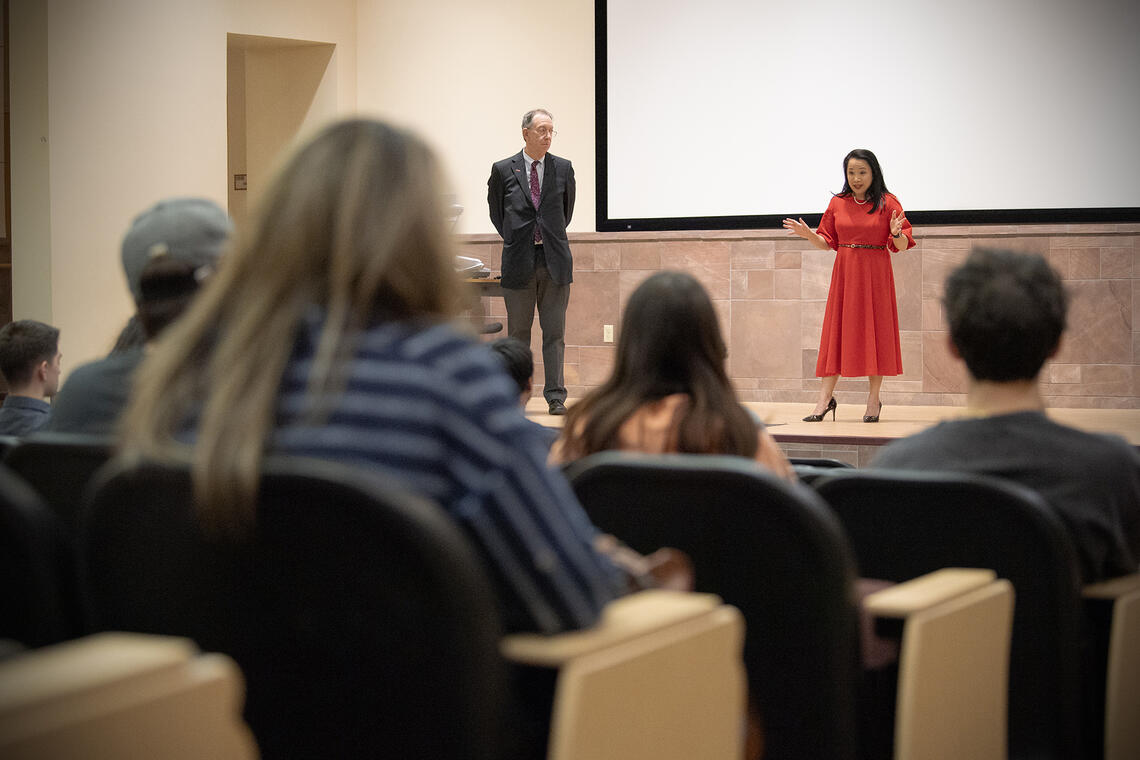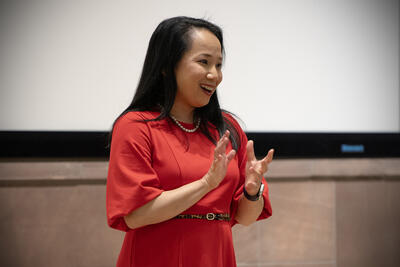
Camille Calimlim Touton, Bureau of Reclamation commissioner and distinguished UNLV Engineering alumna, speaks with students during an open forum on Thursday, March 28. Touton was inducted into the 2024 Academy of Engineering. (Photo provided by the U.S. Bureau of Reclamation)

Camille Calimlim Touton, Bureau of Reclamation commissioner and distinguished UNLV Engineering alumna, speaks with students during an open forum at UNLV on Thursday, March 28. (Photo provided by the U.S. Bureau of Reclamation)
“I want to make sure you know where I started, which was at TBE.”
Bureau of Reclamation 24th Commissioner Camille Calimlim Touton opened her talk on March 28 by paying homage to her alma mater, a reminder to all Rebels that there’s an endless sea of opportunities after college — along with rivers, lakes and oceans.
The UNLV College of Engineering inducted Touton, who graduated from UNLV with dual degrees in civil engineering and communication studies, into the college’s Academy of Engineering last month as a distinguished alumna. Before the ceremony, which honors alumni, faculty and friends who demonstrate the college’s values of education, engagement, inspiration and innovation, Touton held an open forum with students and shared her journey from UNLV to the highest levels of government.
A self-proclaimed “adopted Nevadan,” Touton recalled moving to Las Vegas at a young age. “It’s the reason that my path took me to where I am,” she said. “Our backyard is Lake Mead, and I’ve always wanted to work for the Bureau of Reclamation.”
Touton attributed current civil engineering professors Dave James and Jaci Batista, and former civil engineering professor Tom Piechota, as her mentors who helped fuel her passion for water resources. That passion led her to an internship at the Southern Nevada Water Authority, then a position working at engineering firm G.C. Wallace.
Before long, her passion for conservation led her out of Las Vegas and to Capitol Hill, where she interned for Senator Harry Reid. “I moved to Washington D.C. for a one-year plan,” Touton said. “That has now turned into an 18-year plan.”
In those 18 years, Touton held multiple federal roles, ranging from House of Representative Natural Resources Committee policy advisor to Department of the Interior deputy assistant secretary, before becoming Bureau of Reclamation commissioner. “As engineers, the value that we bring is our ability to speak a different language,” Touton said. “We need to take that and present it to decision makers.”
Touton then opened the floor for questions, elaborating upon her role and actions with the Bureau of Reclamation. Concerned students took the opportunity to ask the commissioner what preventative measures were being taken as the country faced increasing droughts.
Touton recalled the Colorado River experiencing its 21st year of drought when she first took the position as Reclamation commissioner. The river was reaching dangerously low levels, threatening the Glen Canyon Dam’s ability to generate power. She recalled the Bureau moving quickly to stabilize the system, facilitating the largest conservation effort on the Colorado River that will end up saving 3 million-acre-feet of water by the end of 2026.
Even with the progress she’s made thus far, Touton is still constantly looking forward to the future. Acknowledging that climate change is real, she recognized the climate’s unpredictability as a major hurdle to policy-making. “You have to take into account that the hydrology of the last 20 years cannot dictate the future,” she said. “We have to reimagine how we operate these systems that were designed a century ago.”
Though maintaining water sustainability in an impending climate crisis may seem like a daunting task, Touton remained optimistic for the future. “It’s exciting to be a part of,” she said. “And your generation has the opportunity to learn from the past generations. We can do something progressive in ways that we never thought of before.”